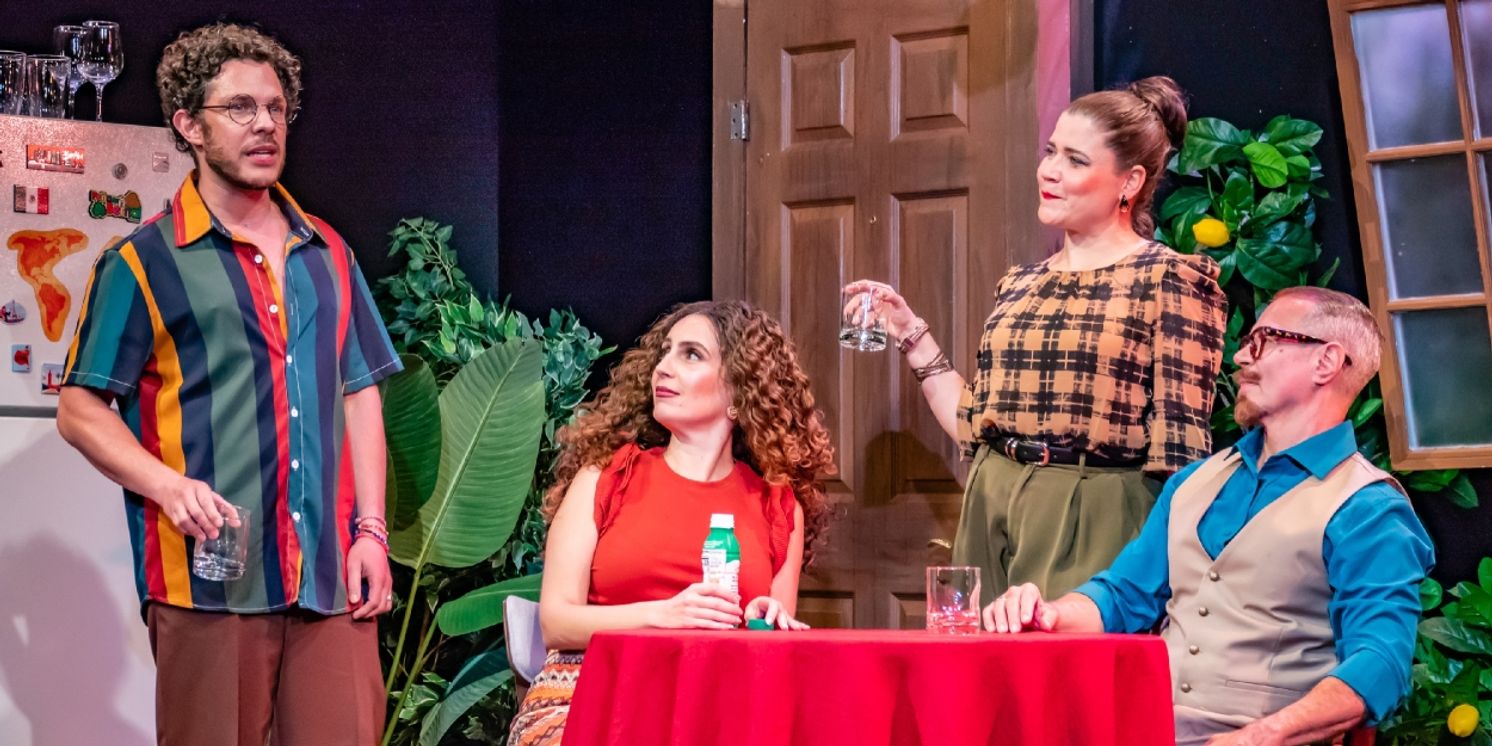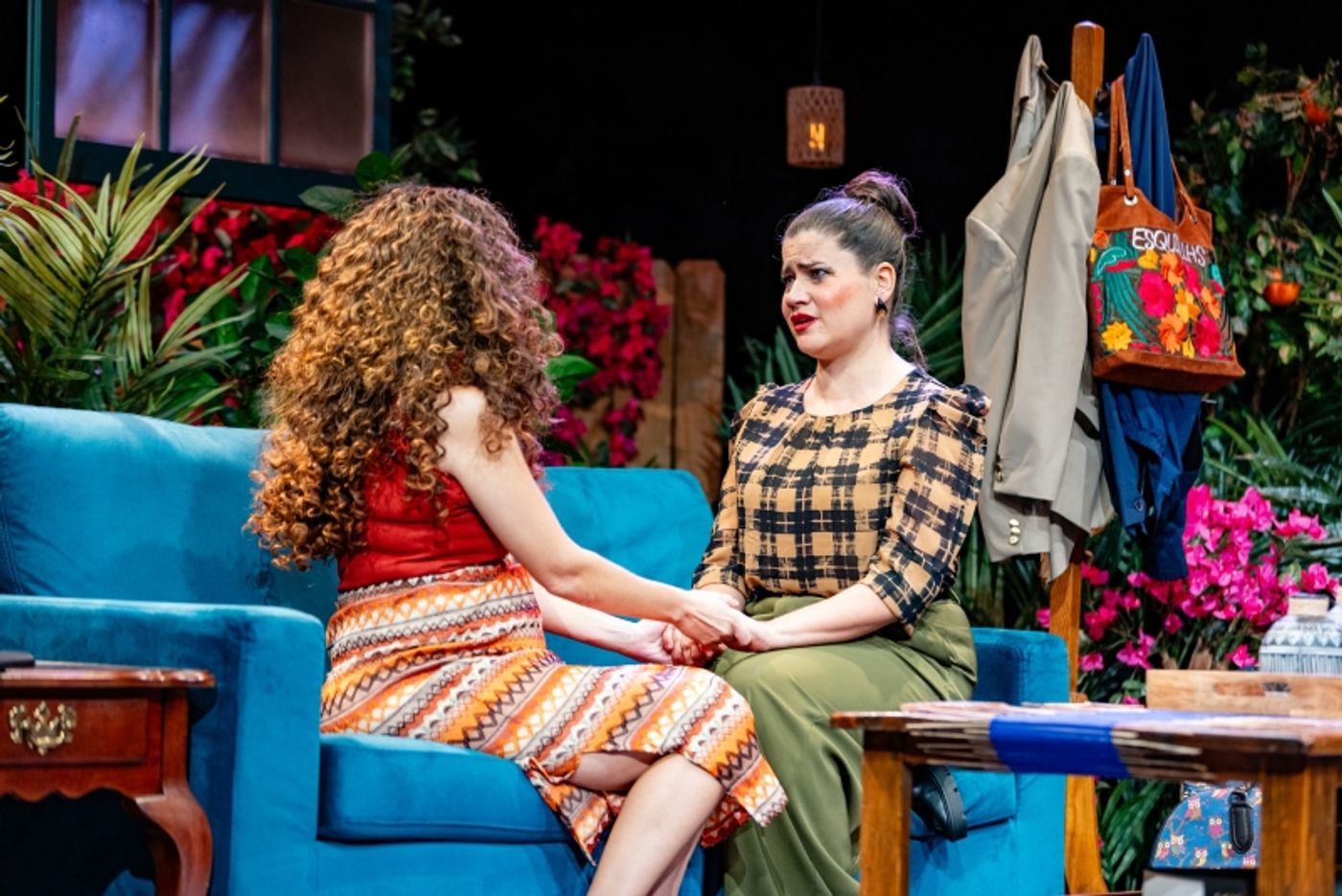Review: THE 22+ WEDDINGS OF HUGO at GALA Hispanic Theatre
The production runs through September 29th

The 22+ Weddings of Hugo premiered to the world on September 5th at GALA Hispanic Theatre's comfortable home in Columbia Heights. The play is based on a real man, who, like the titular Hugo, played by Carlos Castillo, married upwards of 18 people. Of course, one's first question is why is this man marrying so many people?
We get our answer pretty quickly into the show. Hugo and his new wife, Irene, played by Yaiza Figueroa enter Hugo's home, giddy and excited about their new marital vows. They talk about changing one's last name, the nature of marriage, and of course, Irene's boyfriend. It's revealed that Hugo has married Irene to aid in her becoming a legitimate citizen, and that, in fact, he has done this 16 other times with other women and men. Irene expresses her admiration for Hugo's benevolence and polybigamist nature and explains to him her personal history with men—that she has had many "loves her life," and they have all been criminals.
Throughout the show we jump through time, meeting two other of Hugo's spouses. First, Wafa, played by Giselle González, and then Elmar, played by Víctor Salinas. It becomes apparent that each of Hugo's faux paramours brings with them certain topics and themes. In the first act, each spouse gets a one-on-one scene with Hugo, where these themes and issues are explored, contemplated, and debated. While never getting overly heady, and usually maintaining pretty decent laughs, These three scenes provide the philosophical meat of the show.
The first scene, as stated above, involved Irene. Irene and Hugo contemplate love, and why certain people are attracted to others (in Irene's case, bad boys). In her stories is weaved the intricate web of immigration, one of (if not the) major themes of the show. She shares her struggle and voices her frustration in the pay given to undocumented workers, and the ever-present shadow of anxiety that follows her and so many others around. These fears become incredibly tangible when the government/police show up to the house, pounding on the front door and demanding Hugo to come out.
Hugo and Irene are the perfect pair to open the show. Figueroa and Castillo have a convivial chemistry and quickly acclimate the audience to the comedic pacing of the show. Where Castillo/Hugo has the advantage of stage time to open up to the audience, Figueroa/Irene must quickly win us over, and she does. She's funny, bubbly, but thoughtful. While overlapping in ways with an archetypal boy-crazy ditz, she remains layered—witty, passionate, and proud. She's infectious.
We then jump back in time to meet Wafa, the 16th wife of Hugo, and a foil in many ways to Irene (and even Hugo). Irene is a Syrian refugee, and incredibly confident. She recalls to Hugo her recent trip overseas, and how she was held at the airport for days because the authorities needed to make sure she wasn't a terrorist. Everything is matter-of-fact to her—these horrible conditions imposed into her life by war, bigotry, and violence are things that simply need to be dealt with. She acknowledges their atrociousness, and at times allows herself intense anger and sadness, however, she keeps moving. She has to. This scene, and Wafa herself of course bring to the show commentary on the refugee crisis, foreign intervention, and religion. Thematic parallels begin to sprout between the mirrored struggles of Wafa and Irene, two marginalized women tied together through their Makah, or angel, as Wafa calls Hugo.
We then jump back in time again to Elmar, Hugo's passionate writer husband from Mexico. Queerness is announced loudly with Salinas' Elmar—a man in an apron and bright blue briefs, cooking for immigration, who are to arrive shortly. Here, themes of sexuality arise, as Elmar recounts his romantic and sexual past to Hugo, who is surprised to know he has a child, and once had a passionate affair with his female psychologist, who, you guessed it, is the mother of his child. Elmar is an intellectual, as well as a romantic, usually regarding literature. Through him and his words are expressed ponderings about cultural differences between privileged and marginalized nations.
These three spouses are complementary to each other in many ways. They feel like three different parts of the same spirit, almost like Ebenezer Scrooge and his three ghosts. Irene is the soul—alive, ardent, and vivacious. Wafa is the body—grounded, methodical, steadfast. And Elmar is the mind—curious, meandering, and ideological.
_%20Back%20L%20to%20R_%20V%C3%ADctor%20Salinas%2C%20Yaiza%20Figueroa%2C%20and%20Giselle%20Gonz%C3%A1lez_%20Photo%20Daniel%20Mart%C3%ADnez.jpg?format=auto&width=1400)
Throughout these three scenes, however, we don't learn much about Hugo. We know he's a postal worker, a bigamist, and... that's about it. He's nice: funny when he needs to be, and altruistic to the core. However, quite quickly and dramatically, we see a darker, secretive side to him when Elmar discovers a pistol in his drawer. The first act ends.
The second act opens with Hugo in prison, being visited by both Irene and Elmar. This is already an exciting departure from act one, as three people are on stage at a time. We learn that Hugo was not arrested due to his multiple "fake" marriages but to an unrelated, and previously unmentioned incident. We learn that Hugo is a veteran, and due to recent threats to safety, brought his service pistol to his post office job. Triggered by stress and loud noises, Hugo unloaded his pistol into the computer, which is seemingly why he has been arrested. This is yet another contemporary theme being raised—PTSD. This could also explain the otherwise unaddressed gun-pointing at Elmar at the end of act one?
Salinas and Figueroa also share great chemistry here, having been forced to become siblings of sorts, they bicker and joke with each other, but seemingly share an earnest connection, due to their mutual care and love for Hugo. Hugo seems more or less alright, he claims his lawyer says he'll be out soon.
All seems well until Irene gives Hugo the mail left at the house and Hugo finds out one of his previous wives has been deported. He is heartbroken.
Cut to four years later, and Wafa is in the house, alone She puts some groceries away, tidies this and that, before Hugo returns from prison, and they are reunited. Wafah reveals she, in addition to working and taking care of her children, has been taking care of the house, and in a way has fallen in love with it. There is some beautiful and profound dialogue delivered by González with care and delicacy, about humans' relations to buildings.
The second act continues, and Wafah and Hugo fall in love, for real this time, and with Irene and Elmar, they become a kind of found family, the idea of which is a pillar of the show. These people marginalized all in different and similar ways, have come together to care for and love each other, granted this strange grift despite oppressive, xenophobic powers looming over them.
The climax of the show comes when Hugo's reason for his marital crusade is revealed. The whole show his spouses wonder about it, and in the face of the finale, he shares this information with all of them—that he had a tumor pressing on his brain that was messing with his memory, and that it was inoperable and potentially deadly. He met his first wife during this time. Him thinking he would die soon, and her needing citizenship, he offered to marry her. When he found he was still alive he continued to do it, and by doing so connecting himself to so many families. Eventually, he would find out the tumor was shrinking, and his brain was working properly again. Healed as if though by love and connection.
And this is the thesis of the show, that love, empathy, and community can heal us. Of our traumas and our imperfections. It is a beautiful and charming sentiment but falls somewhat flat in the face of the content of the show.
The show, as stated above deals with a myriad of complex and nunaced sociopolitical topics—immigration, refugees, war, colonialism, literature, queerness, religion, gender roles, PTSD, and incarceration. It's daunting to try and handle so many weighted topics, yet the show does so well, weaving them into the story and its characters in a very realistic and believable way. However after sitting with these ideas, stewing in them along with the characters, the answer of "love conquers all" feels a bit flat, almost shallow. Sure it's beautiful, and true even, but there is no strong call to action, no vision of a different path. We are given the blossom of love, and it feels nice to hold, but cannot force it to grow into anything else.
That is not to say it is not important that this piece is bringing this up, let alone in a bilingual setting. The show paramounts intersectionality clearly and loudly, and for that, it should be applauded. However, the softer resolution may do well in placating privileged theater-goers, without ever making them uncomfortable, or referencing direct action.
This situation is paralleled in Hugo. Hugo is highly likable and Castillo truly gives a warm and memorable performance, however, the character feels ever so slightly flat. We watch this man, this so-called angel, be more or less entirely good and altruistic throughout the entire show. There is just a bit of bite left to be desired, any sort of contrast found within his character would make his infinite kindness that much more appreciated. However, it should be noted this is a problem with the piece itself and not this production specifically.
The piece is conventional in many ways. It involves solely dialogue, which always risks being stagnant, especially in the context of contemporary theatre, but the performances and the director, José Zayas' blocking liven things up. The piece never dragged, and the audience was able to sit in moments and tableaus long enough to know them and be satisfied with them.

Harkening back to Wafah's sentiments about the house, the set, too, provides a great stage (literally and figuratively) for our players to play. Designed by Griselle González, with lights by Hailey LaRoe, the set is warm and comforting, evoking yes, the house of Hugo, but also nature, and perhaps a beautiful amalgamation of all the places his spouses come from. The atmosphere was grounded, yet deconstructed enough to allow time and our players to slip through it seamlessly, and land wherever they needed to. Similarly, the costumes, by Rukiya Henry-Fields felt particularly real, each outfit matched well to the character, and the actors' performance, and also felt real—worn, and chosen.
Overall a comforting and sweet time, The 22+ Weddings of Hugo offers a little taste of everything on the menu. It may leave you wanting something more substantial, but none the less was delicious along the way.
The show runs around two hours and is in Spanish with English subtitles. Information on tickets can be found at GALA's website at galatheatre.org.
Reader Reviews
Videos

